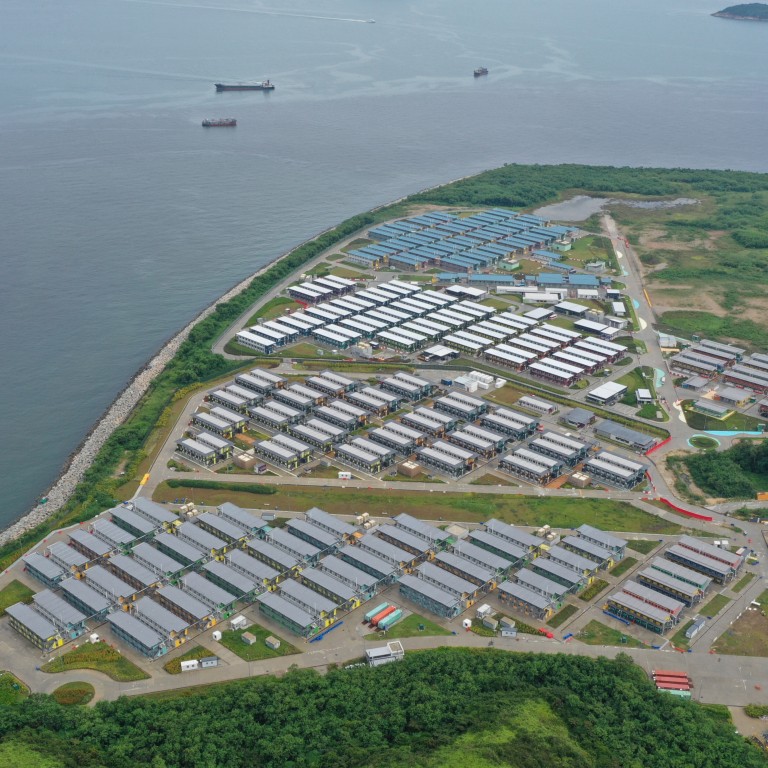
Omicron variant: Hong Kong tightens measures for US arrivals, requires first week of 21-day quarantine to be at Penny’s Bay government facility
- Move prompted by Omicron case detected in traveller from the US, bringing the total number of variant infections confirmed by city so far to five
- The US is the first country outside Africa to be subject to the heightened quarantine requirements
The announcement on Friday evening marked the first time health authorities have moved a country outside Africa into the highest category of risk. The decision was prompted by a confirmed case of the Omicron variant in a traveller from the US.
The government said in a press release that the new rules for US arrivals, based on the “most stringent quarantine and testing requirements”, would kick in from Monday.
The Omicron case, the city’s fifth so far, involved a 37-year-old man who arrived from the US on Tuesday and was among the seven new infections confirmed on Thursday. The man had received two doses of the BioNTech vaccine and was so far asymptomatic.
The other Omicron cases comprised two connected to South Africa and two linked to Nigeria.
The Centre for Health Protection (CHP) stressed that the variant had not spread to the community as all five cases were detected while the patients were either still in the airport’s restricted area or staying at a designated quarantine hotel.
Authorities also confirmed four new Covid-19 cases on Friday, all imported, bringing the city’s overall number of infections to 12,482, with 213 related deaths.
There are currently 69 countries – including the US – in Hong Kong’s high-risk Group A, meaning non-residents from those places are not allowed to enter the city and residents must undergo 21 days of quarantine. Cuba, Kuwait and Liechtenstein were just added to the group on Friday following the discovery of Omicron cases there.
Twelve countries within the group, including South Africa and Nigeria, are subject to even more stringent quarantine measures due to outbreaks of Omicron or their suspected risk of exporting the variant to Hong Kong.
Under the “enhanced” surveillance measures, city residents returning from those 12 countries need to spend their first seven days in Hong Kong at the Penny’s Bay quarantine centre, where they are subject to daily testing. They then need to spend their remaining 14 days of quarantine at a designated hotel, subject to testing every other day.
The first Omicron case in the US was reported on December 1. Since then, at least 43 cases have been recorded in the country.
Health minister Sophia Chan Siu-chee had said previously if there was suspected community transmission of Omicron in a country, authorities would move it into the category with the strictest quarantine and testing rules.
Local transmission has already occurred in numerous countries in Group A, such as Britain, Germany, Denmark and Norway, but they have yet to be upgraded to the enhanced surveillance regime.
Moving the US into the enhanced surveillance category is likely to be unpopular with travellers given the initially poor reputation of Penny’s Bay, which was first built only to house close contacts of Covid-19 patients.
However, those with knowledge of the facility have said services have recently improved. The government bears the costs of internment at Penny’s Bay.
Brian Stone, a Hong Kong resident who has not seen his family in the United States since Christmas two years ago, said he found the policy “incredibly frustrating” on a personal level.
“Spending a week in Penny’s Bay will be very challenging … I cannot put our four-year-old son through a three-week quarantine. It’s too cruel,” he said.
Stone will personally be affected by the policy change, as he had decided to take a trip back to the US after Christmas to visit his ageing parents and wider family.
“My biggest fear is that Hong Kong will ban travel back to Hong Kong while I am back home visiting my family. That would be a catastrophe.”
Separately, the CHP announced it had banned Cathay Pacific flights from Ho Chi Minh City for two weeks effective immediately after three passengers on Flight 764 arriving from the Vietnamese city on Wednesday tested positive for Covid-19.
In a separate development, the Expert Committee on Clinical Events Assessment Following Covid-19 Immunisation in Hong Kong on Friday published its findings on the case of a woman, 66, who died 16 days after receiving the BioNTech jab.
Her case had been the only one of its kind ruled as “indeterminate” in relation to whether the death was caused by the vaccine.
According to the report, a postmortem found the woman had suffered from viral myocarditis, an inflammation of the heart muscle, with a particular viral DNA found in her heart tissue.
As viral infection can cause myocarditis, experts said there was no “conclusive evidence” to suggest her condition had been vaccine-induced, adding the University of Hong Kong would conduct further analysis of the case.


